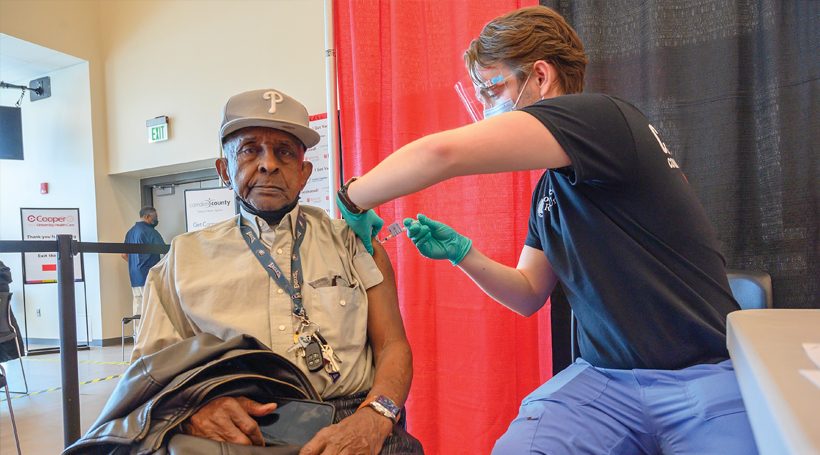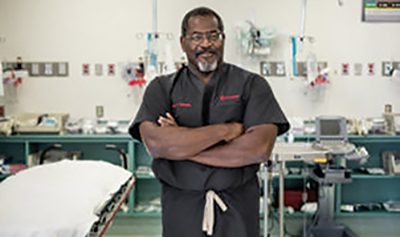The pandemic hit Camden hard. In terms of case numbers, hospitalizations and deaths, the city was one of the most devastated places in the state. There are a number of reasons why, says Reginald Blaber, MD, executive vice president and chief clinical officer of Virtua Health.
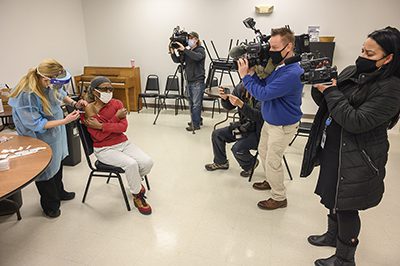 “We know that Covid-19 seems to have a predilection for people of color, and obviously there’s a lot of people of color in Camden city,” he says. “A lot of the population in Camden is suffering from a socioeconomic standpoint, and as a result they’re often living in close quarters. In a small apartment, with people living that close together, it quickly spread through families.”
“We know that Covid-19 seems to have a predilection for people of color, and obviously there’s a lot of people of color in Camden city,” he says. “A lot of the population in Camden is suffering from a socioeconomic standpoint, and as a result they’re often living in close quarters. In a small apartment, with people living that close together, it quickly spread through families.”
“Beating Covid is a team sport.” – Reginald Blaber, MD, executive vice president and chief clinical officer of Virtua Health
Ten months after the first local cases of Covid-19 were confirmed, Camden County reported a total of 39,095 cases. Of those, nearly a quarter were in Camden City.
“Camden has been the hardest hit community in Camden County during the Covid-19 pandemic,” says Kevin O’Dowd, co-CEO of Cooper University Healthcare.
It became immediately apparent that Camden faced a challenge that would require the community’s organizations – and, vitally, its large health systems – to work together toward solutions. Cooper and Virtua teamed up to establish testing centers and distribute protective equipment, food and information.
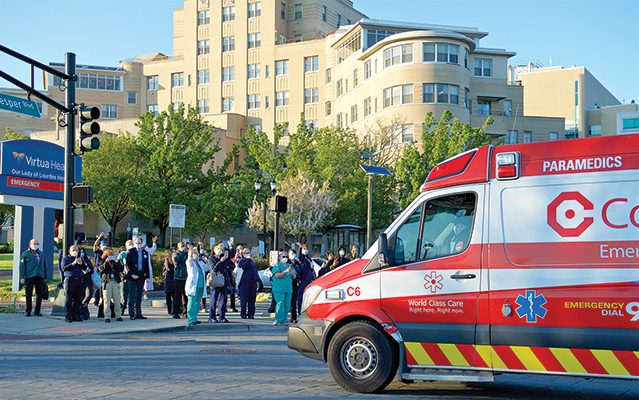 “Cooper and Virtua are vigorous competitors,” Blaber says. “But in the moment, everyone realized that this virus is bigger than any competition. The only way our community was going to persevere through this was if we all worked together. I’m proud of what they’re doing, what we’re doing, and what we’re doing together. Beating Covid is a team sport.”
“Cooper and Virtua are vigorous competitors,” Blaber says. “But in the moment, everyone realized that this virus is bigger than any competition. The only way our community was going to persevere through this was if we all worked together. I’m proud of what they’re doing, what we’re doing, and what we’re doing together. Beating Covid is a team sport.”
Blaber says the bridge between Virtua and Cooper was built by community organizations, like Cooper’s Ferry Partnership.
“The most important word in our name is ‘partnership,’” says the non-profit’s CEO Kris Kolluri. “We’re proud of the fact that, in many ways, we play the role of the fulcrum. We also understand that in order for our partnership to work effectively in the city, we need to work with others who are equally determined to make a positive contribution to the city. We’ve never said we’re going to go it alone.”
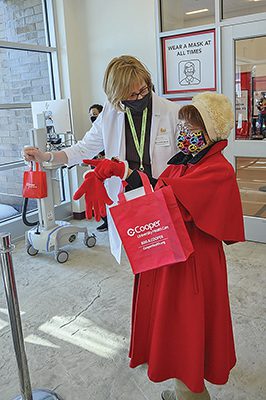 Now, those partnerships are driving successful vaccination efforts. Collaboration between The Salvation Army and Cooper led in February to the opening of a bustling vaccination and education center at The Salvation Army Ray and Joan Kroc Center in the city’s Cramer Hill section. It’s the first neighborhood-based vaccination center for the city.
Now, those partnerships are driving successful vaccination efforts. Collaboration between The Salvation Army and Cooper led in February to the opening of a bustling vaccination and education center at The Salvation Army Ray and Joan Kroc Center in the city’s Cramer Hill section. It’s the first neighborhood-based vaccination center for the city.
“This vaccine is a beginning to the end of this pandemic, and we want to ensure it gets into the hands of every Camden resident.” – Louis Cappelli Jr., Camden County Commissioner Director
It was a match meant to be, says Kolluri, noting that Cooper – with a more than 130-year history in the city – already had a thriving family clinic in the center. The location was key too. The Kroc Center is easy to get to from the Cramer Hill and East Camden neighborhoods, which make up 38 percent of Camden’s population, but account for 44 percent of Covid-19 cases in the city.
Working at a rate of vaccinating 500 people per day, the center was on pace to administer 4,500 shots by the end of March. Almost all those vaccinated were Hispanic or African American and 41 years old or older. 94 percent are Camden residents.
But it wasn’t only shots they received. A multilingual team of healthcare professionals was on hand to answer questions and quell concerns about Covid and the vaccine, says Anthony Mazzarelli, MD, co-CEO of Cooper.
“Along with our Covid-19 testing site in the city, this new neighborhood vaccination and education site helps us provide important healthcare information to local residents from a source they have come to trust,” says Mazzarelli. “It’s also making it easier for them to receive the Covid-19 vaccine to protect themselves and their loved ones from the virus.”
The vaccination and education center is not only novel for Camden, it’s also the first vaccination site to be established at one of the Salvation Army’s network of community centers across the nation.
“The Salvation Army has been fighting Covid-19 on the frontlines since the pandemic began,” says Captain Keith Maynor, Kroc administrator. “We are blessed to partner with Cooper to offer critical vaccination services and educational outreach for our neighbors in the Camden community.”
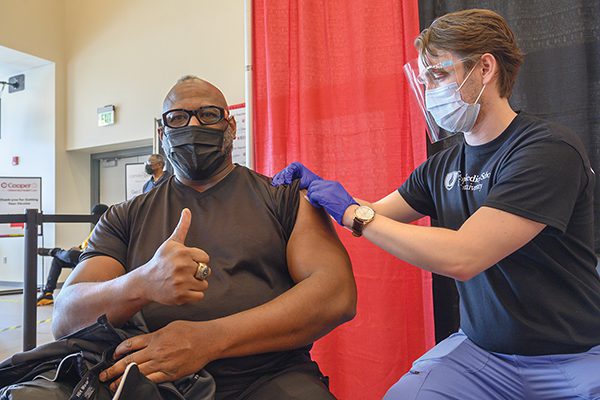 Well known for providing a wide range of community services, the center has been in the national spotlight before. In 2015, it was visited by President Barack Obama when he called Camden “a symbol of promise for the nation.” Camden
Well known for providing a wide range of community services, the center has been in the national spotlight before. In 2015, it was visited by President Barack Obama when he called Camden “a symbol of promise for the nation.” Camden
County Commissioner Director Louis Cappelli Jr. said the use of neighborhood-based institutions like the Kroc Center is key to getting the most vulnerable populations vaccinated.
“Working with our partners at Cooper, we believe opening this clinic will provide us with a strong vehicle to deliver this important vaccine,” Cappelli says. “Ultimately, this vaccine is a beginning to the end of this pandemic, and we want to ensure it gets into the hands of every Camden resident.”
The center is receiving a wide range of support from the Kroc Center, Camden County, Camden County College, Camden Coalition of Health Care Providers, Cooper Medical School of Rowan University and the Rutgers School of Nursing–Camden.
In December, Virtua began its vaccination campaign, starting with healthcare workers, both at Virtua and across the region. By February, Virtua announced it had administered its 100,000th shot.
“Arriving at 100,000 doses is certainly a milestone, and we are just getting started,” says Dennis Pullin, president and CEO of Virtua Health. “We are committed to providing this life-saving service to our community and will do what it takes to get the job done.”
Getting the job done, Blaber adds, will also require creative solutions. Recognizing the importance and influence of faith communities in the city, he says, Virtua has begun partnering with Camden’s diocese and congregations to hold vaccination events in an effort to reach people who don’t have the transportation to travel to a larger vaccination site. “We’ve created a church strategy, going to the faith communities and working with the pastors of big congregations,” he says. “The only way everybody gets vaccinated is if there are as many places to go as possible.”
Early in the vaccine rollout, Cooper’s Ferry Partnership worked with Project H.O.P.E., the Board of County Commissioners and the City of Camden to provide vaccines to 50 seniors at First Nazarene Baptist Church.
“We put together a bootstrap operation, got each one of those seniors transportation to the site and got them vaccinated,” Kolluri says, adding that CAMcare and South Jersey Transportation Authority helped with the vaccine distribution and transportation. “Those kinds of small yet meaningful projects are what I think drives Cooper’s Ferry.”
Meeting the health needs of Camden’s residents – chief among them testing and vaccinations – has been the most pressing priority in the city for the last year. But it’s not the only need Camden’s residents have been dealing with. Behind the scenes, more partnerships have been working to overcome other challenges.
“We saw a need for food,” says Kolluri. “We partnered with NJ Farmers for Hunger and distributed almost 15,000 pounds of produce and proteins.” Despite social distancing and isolation orders, the people of Camden still needed access to an important resource: fun. Recognizing the need, Cooper’s Ferry brought back a classic to the city. Drive-in movies, which got their start in Camden in 1933, made for the perfect socially distant activity.
“We knew people, being basically trapped in their homes, would need relief,” Kolluri says. “We thought a drive-in was a good way to keep people safe but also give them this opportunity to get out of the house to do something alongside their neighbors and community.”
They worked with other non-profit and business partners to put on the events, and even the Camden County Police Department got involved. “That was a really unique collaboration,” says Camden County Police Chief Gabriel Rodriguez. “We brought the water ice. We had hundreds of cars show up, and it was all free, thanks to our corporate partners.”
Despite the incredible struggles of the last year, Kolluri says support from community partners has never been stronger. “None of this would’ve been possible without strong partnership and Camden County,” he says.
Those supporters, he says, have stepped forward to ensure not only Camden’s survival through the pandemic, but in its bright future.
Making it easier to get a shot
The Salvation Army Ray and Joan Kroc Community Center in Cramer Hill was on track to provide 4,500 shots by the end of March.
A multilingual staff serves both to allay any concerns about the vaccine and to administer shots, approximately 500 per day.
Of those getting vaccinated at the Kroc Center: 94% are Camden residents 86% are Hispanic & African American 86% are 41 or older
The center is a collaboration between the Kroc Center and Cooper University Healthcare.
One Cooper doctor’s vaccination mission
As a frontline healthcare worker, John Porter, MD, was among the first wave of people eligible to get the Covid-19 vaccine when it rolled out in December. But the director for the Center for Trauma Services/division head of Trauma Surgery at Cooper University Health Care didn’t jump to get in line – to the surprise of many of his medical colleagues.
“I told them I wasn’t going to get the vaccine first, and the reason was the history of medicine, vaccines and experimentation in the United States on Black people,” says Porter, a Camden resident. “It’s not good.”
“I won’t belittle anyone’s concerns. I won’t belittle anyone’s fears. I will acknowledge them and tell them I had the same ones.” – John Porter, MD
The other reason was that he wanted to wait until there was more scientific data. At that early date, he explains, of 20,000 people who received vaccines in studies, only 800 were Black.
“That wasn’t enough for me to have this needle go into my arm,” Porter says, noting that he was finally satisfied after 2 million people had been vaccinated and the data proved that shots were safe and effective for people of color.
Since Porter got vaccinated, he’s now on a mission to urge all Camden residents to do so as well. During a Zoom call last month to leaders of a Camden faith-based group sponsored by Camden County Metro Police Chief Gabriel Rodriguez, he spoke at length about the effectiveness and the safety of the vaccines available and patiently answered questions. “I won’t belittle anyone’s concerns,” he says. “I won’t belittle anyone’s fears. I will acknowledge them and tell them I had the same ones. And I’ll talk about the science and why the vaccines are safe.”
There’s urgency in convincing Camden residents that getting the vaccine is in their best interest, he notes, explaining how during the first surge of Covid last year he spent 83 days in a row working in Cooper’s ICU and saw firsthand how the virus disproportionately affects people of color.
On the Zoom call, Porter said he hoped the faith leaders will take his message back to their communities, but he also offered to talk to people personally.
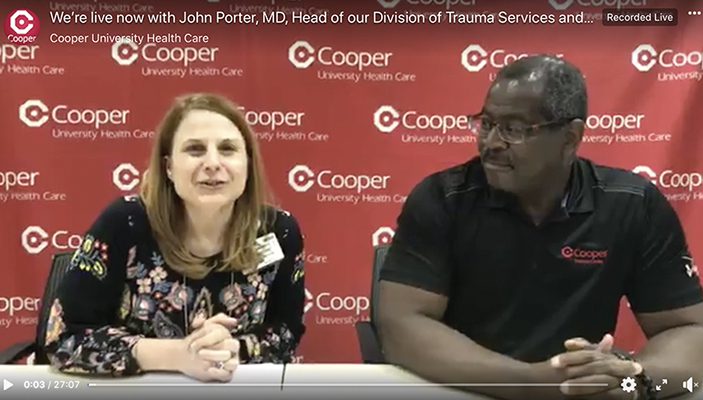 “I understand completely that people are nervous about getting the vaccine because of the history of medicine on our people,” he adds.
“I understand completely that people are nervous about getting the vaccine because of the history of medicine on our people,” he adds.
Porter’s story is also available on YouTube. He’s one of a half dozen Cooper officials who made videos encouraging vaccinations for an education series.
Porter first started talking up the vaccines on the job at Cooper. As word of his story got out, demand increased for him to help spread the word. He’s since talked at apartment complexes and schools as well as to faith-based organizations.
As the nearly hour-long Zoom call wrapped up, it was clear his message was getting across. Several leaders noted that his earnestness and the way he explained how the vaccines worked had won them over. One pastor said that before the call she was not going to get the vaccine.
“But,” she said, “you have literally changed my mind.”


